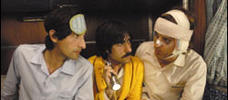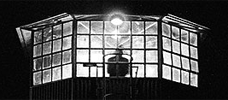Reviews
Sidney Lumet
USA, 2007
Credits
Review by Leo Goldsmith
Posted on 09 October 2007
Source ThinkFilm 35mm Print
Categories The 45th New York Film Festival
Philip Seymour Hoffman has carved out a special niche for himself as a character actor in contemporary Hollywood, and his Andy Hanson in Before the Devil Knows You’re Dead is quintessential. Pervy, belligerent, self-loathing, substance-dependent, greedy, oily, spiteful, pathetic – he is an omnibus of Hoffman types and tropes, from the deliciously snitchy George Willis, Jr., in Scent of a Woman to the pitiable Scotty J. in Boogie Nights to the sweaty Allen in Happiness to the unscrupulous, loudmouthed Dean Trumbell in Punch-Drunk Love. Andy Hanson is all of these characters and more (or less): a middle-management real estate HR man with coke and heroin habits, a wife who has lost interest in sex (with him, anyway), and a propensity for embezzling money.
Our introduction to Andy — and to the film — typifies the character well enough: loudly panting (as only Hoffman can) as he unceremoniously bangs his wife, Gina, in a hotel room in Brazil, he glances at the mirrors to his right and left in order to admire his form. As shocking and unpleasant as this image is, the scene shifts from grotesquerie to pathos once the two collapse resplendently. This successful bout of intercourse is the first in many months for Andy and Gina, and it will probably be the last for a long while, if it ever happens again. Vacation has allowed them a little breathing room, a small escape from the complications and conundrums of their life back in New York. There is a tiny indication on Andy’s face that once back in the clutches of their life in the city, these distractions and problems will return; there is no permanent escape from them. Unless, of course, you have money.
Back in New York, we meet Andy’s brother Hank, a harried and greasy-looking deadbeat dad who is still the object of disdain and verbal abuse from his ex-wife. Played with watery eyes and a gelatinous spine by Ethan Hawke, Hank is the consummate middle-aged little brother to Andy’s bullying first-born: he is the butt of Andy’s insults even as he accepts a middle-management position in Andy’s real estate firm and little handouts from Andy’s money-clip. But neither brother is quite what he seems: Andy’s shiny ties and Regis Philbin suits conceal a warped mess of substance dependency and debts that he pays off with the company payroll; and Hank drinks most of the money he should be paying in alimony while escaping every Thursday afternoon for “meetings” at his apartment with Gina, Andy’s wife.
Both brothers suffer from a surfeit of self-inflicted problems and the lack of any greater sense or courage to deal with them, and Andy’s recognition of this deficiency — in both himself and his brother — prompts the planning of a scheme that will secure them both financially and therefore allow them to solve their many problems. The plan is a “simple” heist, to knock over a small mom-and-pop jewelry store in Westchester. It is, as Andy claims, a victimless crime because the stolen merchandise would be an insurance write-off and the owners are old. But this mom-and-pop store happens to be that of Andy and Hank’s actual mom and pop, and therein the problems arise. That problems will surface is predictable enough, but the plot snakes loosely and non-linearly around the events of the heist, its prelude and its aftermath, with increasingly dire circumstance, as guns go off, damning clues are left behind, confessions and revelations are let out, and the two brothers descend ever deeper into hot water.
Amid this chaos, Sidney Lumet, fast approaching ninety and having directed some sixty feature films, assembles a controlled and steady mood of impending doom. First-time screenwriter Kelly Masterson provides an artful story that is perhaps a little showy in its creative chronology, but is particularly effective in its cruel twists of fate and deceptive red herrings. Especially fascinating are her character studies, and the excellent cast and Lumet’s fine direction provide a good platform for several key (and nomination-friendly) performances: Hoffman’s tragic scumbag, Hawke’s gutless everyman, and Albert Finney’s heartbreaking, almost frightening turn as their tortured father. The only slight disappointment is that Marisa Tomei, uniformly excellent (and quite stunning) as she is, is not given quite enough substance — or clothing — in her role as Gina. Hers is obviously a pivotal role, and though we register her familiar scenario as that of the frigid wife-lusty adultress type, her own thoughts (aside from her total ignorance of her husband’s problems) remain cloudy.
But aside from this minor letdown, Lumet is able to cram scenes with large details about small peripheral characters and small details about principal ones. Hawke conveys his character succinctly in a 30-second aborted suicide attempt, pondering a handful of pills in his bathroom before sheepishly siphoning them back into the bottle; Andy visits his Trump World Tower, trust-fund, heroin-dealer and, in attempting to unload his problems with his father, is told curtly to “get a wife or get a shrink.” These moments typify their characters, pegging them as lost souls for whom the world has little sympathy and no time, and Lumet and his actors are able to make these moments not only credible, but touching. For all of their greed and stupidity, and all of the usual rashness that money inspires in those who need it (and need it quickly), Hank and Andy are still highly sympathetic (if pitiable) characters. Perhaps they are products of faulty family backgrounds, misguided drives for financial success, or loveless relationships, but the film never lights on any one cause to explain away their actions. They are, like Sonny in Lumet’s own Dog Day Afternoon, fuck-ups and outcasts, and as complex, fraught individuals, they have their own complex, fraught reasons for acting as they do.
More The 45th New York Film Festival
-

The Darjeeling Limited
2007 -

Hamlet
1921 -

The Romance of Astrea and Celadon
2007 -

Secret Sunshine
2007 -

Paranoid Park
2007 -

Alexandra
2007 -

Before the Devil Knows You’re Dead
2007 -

The Diving Bell and the Butterfly
2007 -

The Last Mistress
2007 -

The Man from London
2007 -

I’m Not There
2007
We don’t do comments anymore, but you may contact us here or find us on Twitter or Facebook.



